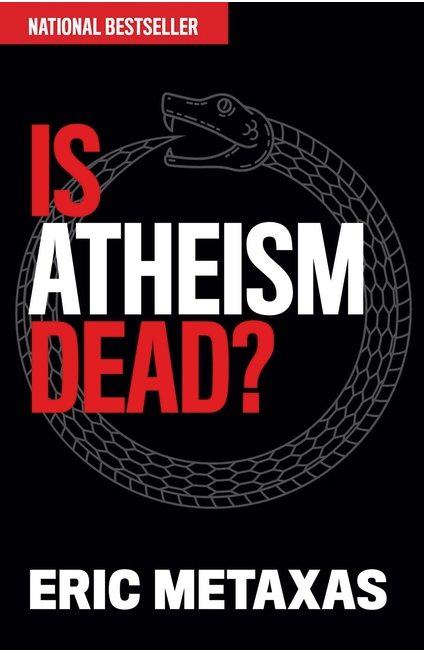Full disclosure: I listen to Eric Metaxas regularly and I think he is awesome. He’s not only hilarious and entertaining, but is a strong Believer in Christ. His faith is not solely based on emotion (although it certainly isn’t devoid of it), but on methodically thinking through the facts and historical evidence. “Is Atheism Dead?” clearly shows how he takes his faith seriously, investigating it as objectively as possible, and impartially weighing all of the evidence to come to a well-thought-out conclusion.
To be fair, Metaxas really didn’t need to give all of the insane amounts of information to prove his point. If only a fraction of the evidence given in this book was what we had to go on, it would be enough. Because that’s how convincing it is. The mountains of facts and data that Metaxas has put together is breathtaking, proving without a shadow of a doubt that we are definitely not here by accident. He was also able to successfully argue the fact that the Bible is an accurate source of history, and a reliable book of our faith.
God’s fingerprints in science
The book begins by describing all of the incredibly precise scientific properties needed to sustain life. From the tiny cell to the vastness of the universe, numbers do not lie. Honestly, after a while, it’s all a little mind numbing. The specificity required for life on earth is amazing. I wholeheartedly agree with Metaxas when he said, “…It didn’t make sense that we existed. And yet, here we are…” (p. 40).
There are several attributes in nature that if off by the tiniest amount, life could not exist. This is more popularly known as the fine-tuning argument for the existence of God. Just one of the fine-tuning arguments is enough to make your head spin. The American Nobel Prize-winning physicist Steven Weingerg, who by the way is an atheist, has said, “that if the value of this cosmological constant (i.e. the energy density of the universe) were different by just one part in 10 to the 120th power, life could not exist,” (page 66).
For those of you who may not be familiar with 10 to the power of something, let’s just say that is an enormous number. The chances are beyond our comprehension. According to Metaxas, “The number of atoms in the universe is ten to the eightieth power,” (page 66) for comparison. How these scientists are able to come up with these numbers, I don’t know. But I’m just glad I’m not the one figuring it all out.
God’s fingerprints in archaeology and history
Metaxas then goes on to tackle archaeology. To put it succinctly, as archaeologists have made more discoveries and historians have been able to gather more information, the bible continues to be corroborated over and over again. For example, when skeptics have pointed to the lack of historical evidence for certain events or people groups in the bible, later archaeological digs have uncovered the missing clues, giving more credence to the veracity and reliability of the referenced Scripture verse(s).
God’s fingerprints on Truth
Finally, Metaxas covers, “What is Truth” in the last section of the book. He details with chilling clarity the stark reality of how secular, humanistic beliefs have destroyed countries and have devastated innocent people throughout history. Many people have tried to implement this kind of ideology, however history has repeatedly shown how destructive it always is.
Elites have often asserted they somehow know what’s best for everyone. According to several of these chosen few, traditional religion (and all that it entails) is something held onto by the masses who have no education and are ignorant, at best. Their arrogance is unbelievable. Fortunately, the overwhelming historical evidence of destruction and suffering left in the wake of governments taken over by this ideology begs to differ. Clearly, if one were to study a little history, the truth would be readily evident.
I strongly encourage people to read this book. If for nothing else then to gain confidence and assurance that we serve a truly incredible God. At a time when there is so much uncertainty and fear running rampant in our society, it is comforting to know that if God cared so much to set Earth in motion, if He can weave the intricacies of history together, and if somehow His Word still stands as Truth throughout it all, I think we’re going to be OK. In fact, we’re going to be better than OK. We can praise His name for Who He is and for all He’s done.
He is a good, good Father. And He is amazing.










